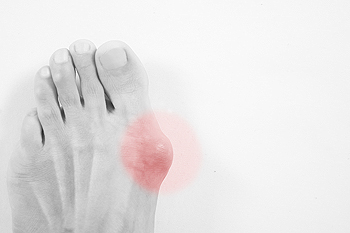
A bunion is a noticeable foot condition. It is a hard lump that develops on the base of the big toe, and if not promptly treated, it may cause the other toes to shift toward each other. It is a common condition that can happen from wearing shoes that do not have ample room for the toes to move freely. As the bunion becomes larger, corns may form on the side of the bunion as it touches the shoe. Genetic factors may contribute to a bunion, and surgery may be an option for permanent removal. A bunion can be uncomfortable and may cause arthritis to develop. Additionally, as it grows, it may become swollen and red, likely causing the need to purchase larger shoes. Relief may be found when the correct shoe size is worn, and a protective pad is put over the bunion to reduce friction from shoes. Bunions are treated by a podiatrist, and it is strongly urged that you contact this type of doctor to determine what the best treatment is for you.
If you are suffering from bunions, contact Stephanie Tine, DPM of Flamingo Foot and Ankle. Our doctor can provide the care you need to keep you pain-free and on your feet.
What Is a Bunion?
A bunion is formed of swollen tissue or an enlargement of boney growth, usually located at the base joint of the toe that connects to the foot. The swelling occurs due to the bones in the big toe shifting inward, which impacts the other toes of the foot. This causes the area around the base of the big toe to become inflamed and painful.
Why Do Bunions Form?
Genetics – Susceptibility to bunions are often hereditary
Stress on the feet – Poorly fitted and uncomfortable footwear that places stress on feet, such as heels, can worsen existing bunions
How Are Bunions Diagnosed?
Doctors often perform two tests – blood tests and x-rays – when trying to diagnose bunions, especially in the early stages of development. Blood tests help determine if the foot pain is being caused by something else, such as arthritis, while x-rays provide a clear picture of your bone structure to your doctor.
How Are Bunions Treated?
- Refrain from wearing heels or similar shoes that cause discomfort
- Select wider shoes that can provide more comfort and reduce pain
- Anti-inflammatory and pain management drugs
- Orthotics or foot inserts
- Surgery
If you have any questions, please feel free to contact our office located in Fort Lauderdale, FL . We offer the newest diagnostic and treatment technologies for all your foot care needs.